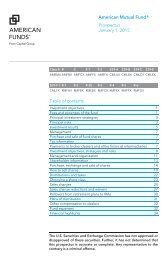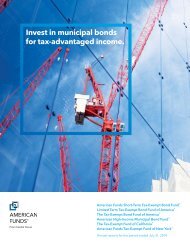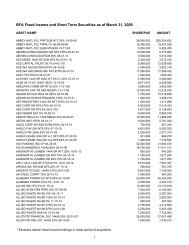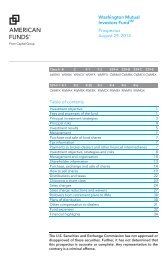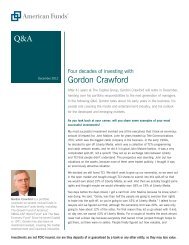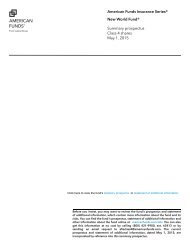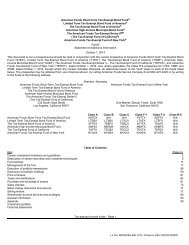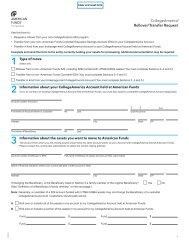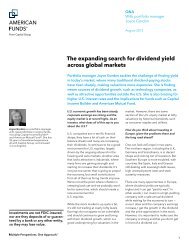elating to an issuer and the time a rating is assigned and updated. The investment adviser considers these ratings <strong>of</strong> securities asone <strong>of</strong> many criteria in making its investment decisions.Bond rating agencies may assign modifiers (such as +/–) to ratings categories to signify the relative position <strong>of</strong> a credit within therating category. Investment policies that are based on ratings categories should be read to include any security within that category,without giving consideration to the modifier except where otherwise provided. See the Appendix for more information about creditratings.Pass-through securities —The fund will invest in various debt obligations backed by pools <strong>of</strong> mortgages or other assets including,but not limited to, loans on single family residences, home equity loans, mortgages on commercial buildings, credit card receivablesand leases on airplanes or other equipment. Principal and interest payments made on the underlying asset pools backing theseobligations are typically passed through to investors, net <strong>of</strong> any fees paid to any insurer or any guarantor <strong>of</strong> the securities. Passthroughsecurities may have either fixed or adjustable coupons. These securities include:<strong>Mortgage</strong>-backed securities — These securities may be issued by U.S. government agencies and government-sponsoredentities, such as Ginnie Mae, Fannie Mae and Freddie Mac, and by private entities. The payment <strong>of</strong> interest and principal onmortgage-backed obligations issued by U.S. government agencies may be guaranteed by the full faith and credit <strong>of</strong> the U.S.government (in the case <strong>of</strong> Ginnie Mae), or may be guaranteed by the issuer (in the case <strong>of</strong> Fannie Mae and Freddie Mac).However, these guarantees do not apply to the market prices and yields <strong>of</strong> these securities, which vary with changes ininterest rates.<strong>Mortgage</strong>-backed securities issued by private entities are structured similarly to those issued by U.S. government agencies.However, these securities and the underlying mortgages are not guaranteed by any government agencies and the underlyingmortgages are not subject to the same underwriting requirements. These securities generally are structured with one or moretypes <strong>of</strong> credit enhancements such as insurance or letters <strong>of</strong> credit issued by private companies. Borrowers on the underlyingmortgages are usually permitted to prepay their underlying mortgages. Prepayments can alter the effective maturity <strong>of</strong> theseinstruments. In addition, delinquencies, losses or defaults by borrowers can adversely affect the prices and volatility <strong>of</strong> thesesecurities. Such delinquencies and losses can be exacerbated by declining or flattening housing and property values. This,along with other outside pressures, such as bankruptcies and financial difficulties experienced by mortgage loan originators,decreased investor demand for mortgage loans and mortgage-related securities and increased investor demand for yield, canadversely affect the value and liquidity <strong>of</strong> mortgage-backed securities.Adjustable rate mortgage-backed securities — Adjustable rate mortgage-backed securities (“ARMS”) have interest ratesthat reset at periodic intervals. Acquiring ARMS permits the fund to participate in increases in prevailing current interest ratesthrough periodic adjustments in the coupons <strong>of</strong> mortgages underlying the pool on which ARMS are based. Such ARMSgenerally have higher current yield and lower price fluctuations than is the case with more traditional fixed income debtsecurities <strong>of</strong> comparable rating and maturity. In addition, when prepayments <strong>of</strong> principal are made on the underlyingmortgages during periods <strong>of</strong> rising interest rates, the fund can reinvest the proceeds <strong>of</strong> such prepayments at rates higher thanthose at which they were previously invested.Page 4
<strong>Mortgage</strong>s underlying most ARMS, however, have limits on the allowable annual or lifetime increases that can be made in theinterest rate that the mortgagor pays. Therefore, if current interest rates rise above such limits over the period <strong>of</strong> the limitation,the fund, when holding an ARMS, does not benefit from further increases in interest rates. Moreover, when interest rates arein excess <strong>of</strong> coupon rates (i.e., the rates being paid by mortgagors) <strong>of</strong> the mortgages, ARMS behave more like fixed incomesecurities and less like adjustable rate securities and are subject to the risks associated with fixed income securities. Inaddition, during periods <strong>of</strong> rising interest rates, increases in the coupon rate <strong>of</strong> adjustable rate mortgages generally lag currentmarket interest rates slightly, thereby creating the potential for capital depreciation on such securities. The fund’s currentpractice is to invest primarily in ARMS issued by U.S. government sponsored entities.Collateralized mortgage obligations (CMOs) — CMOs are also backed by a pool <strong>of</strong> mortgages or mortgage loans, whichare divided into two or more separate bond issues. CMOs issued by U.S. government agencies are backed by agencymortgages, while privately issued CMOs may be backed by either government agency mortgages or private mortgages.Payments <strong>of</strong> principal and interest are passed through to each bond issue at varying schedules resulting in bonds withdifferent coupons, effective maturities and sensitivities to interest rates. Some CMOs may be structured in a way that wheninterest rates change, the impact <strong>of</strong> changing prepayment rates on the effective maturities <strong>of</strong> certain issues <strong>of</strong> these securitiesis magnified. CMOs may be less liquid or may exhibit greater price volatility than other types <strong>of</strong> mortgage or asset-backedsecurities.Commercial mortgage-backed securities — These securities are backed by mortgages on commercial property, such ashotels, <strong>of</strong>fice buildings, retail stores, hospitals and other commercial buildings. These securities may have a lower prepaymentuncertainty than other mortgage-related securities because commercial mortgage loans generally prohibit or impose penaltieson prepayments <strong>of</strong> principal. In addition, commercial mortgage-related securities <strong>of</strong>ten are structured with some form <strong>of</strong> creditenhancement to protect against potential losses on the underlying mortgage loans. Many <strong>of</strong> the risks <strong>of</strong> investing incommercial mortgage-backed securities reflect the risks <strong>of</strong> investing in the real estate securing the underlying mortgageloans, including the effects <strong>of</strong> local and other economic conditions on real estate markets, the ability <strong>of</strong> tenants to make rentalpayments and the ability <strong>of</strong> a property to attract and retain tenants. Commercial mortgage-backed securities may be lessliquid or exhibit greater price volatility than other types <strong>of</strong> mortgage or asset-backed securities and may be more difficult tovalue.Asset-backed securities — These securities are backed by other assets such as credit card, automobile or consumer loanreceivables, retail installment loans or participations in pools <strong>of</strong> leases. Credit support for these securities may be based onthe underlying assets and/or provided through credit enhancements by a third party. The values <strong>of</strong> these securities aresensitive to changes in the credit quality <strong>of</strong> the underlying collateral, the credit strength <strong>of</strong> the credit enhancement, changes ininterest rates and at times the financial condition <strong>of</strong> the issuer. Obligors <strong>of</strong> the underlying assets also may make prepaymentsthat can change effective maturities <strong>of</strong> the asset-backed securities. These securities may be less liquid and more difficult tovalue than other securities.Page 5
- Page 1 and 2: American Funds Mortgage Fund ®Part
- Page 3: Description of certain securities a
- Page 7 and 8: Certain rights provided to holders
- Page 9 and 10: oard of trustees, taking into accou
- Page 11 and 12: Fund policiesAll percentage limitat
- Page 13 and 14: Management of the fundBoard of trus
- Page 15 and 16: Name, age andposition with fund(yea
- Page 17 and 18: Name, age andposition with fund(yea
- Page 19 and 20: Name, age andposition with fund(yea
- Page 21 and 22: Dollar range 1of fundshares ownedAg
- Page 23 and 24: different transfer agent fees and o
- Page 25 and 26: the committee. The nominating and g
- Page 27 and 28: First Clearing, LLCCustody AccountS
- Page 29 and 30: Investment adviser — Capital Rese
- Page 31 and 32: investment adviser may delegate all
- Page 33 and 34: During the 2012 fiscal year, admini
- Page 35 and 36: Following is a brief description of
- Page 37 and 38: Other compensation to dealers — A
- Page 39 and 40: Execution of portfolio transactions
- Page 41 and 42: among the funds and other accounts
- Page 43 and 44: Subject to board policies, the auth
- Page 45 and 46: sales, at the last available bid pr
- Page 47 and 48: Taxes and distributionsDisclaimer:
- Page 49 and 50: countries. The application of the f
- Page 51 and 52: Your bank should include the follow
- Page 53 and 54: Frequent trading of fund shares —
- Page 55 and 56:
Sales chargesClass A purchasesPurch
- Page 57 and 58:
Moving between accounts — Investm
- Page 59 and 60:
Shareholders purchasing shares at a
- Page 61 and 62:
life insurance policies that were e
- Page 63 and 64:
Selling sharesThe methods for selli
- Page 65 and 66:
Automatic exchanges — For all sha
- Page 67 and 68:
General informationCustodian of ass
- Page 69 and 70:
Summary prospectuses, prospectuses,
- Page 71 and 72:
Fund numbers — Here are the fund
- Page 73 and 74:
Fund numbersFundClass529-AClass529-
- Page 75 and 76:
Fund numbersFund Class A ClassR-1Cl
- Page 77 and 78:
American Funds Tax-ExemptPreservati
- Page 79 and 80:
Standard & Poor’sLong-term issue
- Page 81 and 82:
Fitch Ratings, Inc.Long-term credit
- Page 83 and 84:
Moody’sCommercial paper ratings (
- Page 85 and 86:
Fannie Mae 6.00% 2042 3 4,040 4,453
- Page 87 and 88:
Tennessee Valley Authority 1.875% 2
- Page 89 and 90:
Federal agency mortgage-backed obli
- Page 91 and 92:
Net assets consist of:Capital paid
- Page 93 and 94:
charge)Classes B and 529-B* None De
- Page 95 and 96:
Thinly traded securities — There
- Page 97 and 98:
Share classadministrative services
- Page 99 and 100:
(1) Includes exchanges between shar
- Page 101:
8/31/2012 10.16 .07 .34 .41 (.16) (



